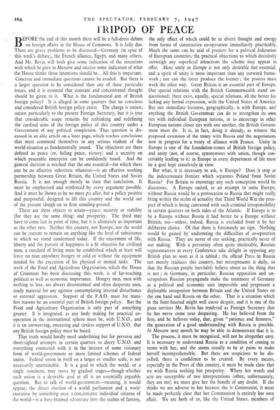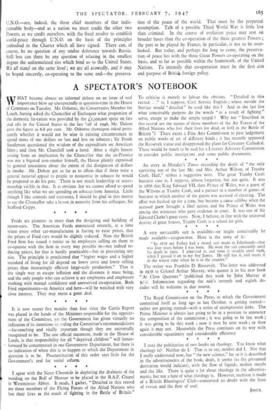FRIPOD OF PEACE
BEFORE the end of this month there will be a full-dress debate on foreign affairs in the House of Commons. It is fully due. There are grave problems to be discussed—Germany (in spite of this week's debate), the French alliance, Egypt, and many others. And Mr. Bevin will both give some indication of the intentions with which he goes to Moscow and receive some indication of what the House thinks those intentions should be.. All this is important. Concrete and immediate questions cannot be evaded. But there is a larger question to be considered than any of these particular issues, and it is essential that constant and concentrated thought should be given to it. What is the fundamental aim of British foreign policy? It is alleged in -some quarters that no conscious and considered British foreign policy exists. The charge is unjust, unjust particularly to the present Foreign Secretary, but it is true that considerable scope remains for rethinking and redefining the cardinal aims of the foreign policy of this country under a Government of any political complexion. That question is dis- cussed in an able article on a later page, which reaches conclusions that must commend themselves to any serious student of the world-situation as fundamentally sound. The objectives are there defined as peace (or, failing peace, victory) and a security on which peaceable enterprise can be confidently based. And the general decision is reached that the one essential—for which there can be no effective substitute whatever—is an effective working partnership between Great Britain, the United States and Soviet Russia. It is not enough merely to state that conclusion. It must be emphasised and reinforced by every argument possible. And it must be 'shown to be no mere pis aller, but a policy positive and purposeful, designed to lift this country and the world out of the present slough on to firm standing-ground.
There are three objects to attain—peace, security or stability (for they are the same thing) and prosperity. The third may have to come last in point of time, but it is ultimately as important as the other two. Neither this country, nor Europe, nor the world can be content to remain on anything like the level of subsistence to which we stand condemned today. If the enjoyment of life, liberty and the pursuit of happiness is a fit objective for civilised men, a standard of living must be established which at least will leave no man anywhere hungry or cold or without the equipment needed for the execution of his physical or mental tasks. The work of the Food and Agriculture Organisation, which the House of Commons has been discussing this week, is of far-reaching political as well as economic importance. Hungry men, men with nothing to lose, are always discontented and often desperate men, ready material for any agitator contemplating internal disturbance or external aggression. Support of the F.A.O. must for mani- fest reasons be an essential part of British foreign policy. But the Food and Agriculture Organisation is only part of something greater. It is integrated, as any body making for practical co- operation in the international sphere must be, with U.N.O., and it is on unswerving, unceasing and tireless support of U.N.O. that any British foreign policy must be based.
That truth would hardly need underlining but for perverse and short-sighted attempts in certain quarters to decry U.N.O. and everything connected with it in the interest of some visionary form of world-government or more limited schemes of federal union. Federal union in itself on a larger or smaller scale, is not necessarily unattainable. It is a goal to which the world, or a single continent, may move by gradual stages—though whether such union is a desirable goal at all is an essentially arguable question. But to talk of world-government—meaning, it would appear, the direct election of a world parliament and a world executive by something over r,000,000,000 individual citizens of the world—is a hare-brained adventure into the realms of fantasy, the only effect of which could be to divert thought and energy from forms of constructive co-operation immediately practicable.
Much the same can be said of projects for a political federation of European countries, the practical objections to which decisively outweigh any superficial attractions' the scheme may appear to offer. More unity in Europe is not only desirable but essential, and a spirit of unity is more important than any outward frame- work ; nor can the latter produce the former ; the process must work the other way. Great Britain is an essential part of Europe. Our special relations with the British Commonwealth stand un- questioned; there exist, equally, special relations, all the better for lacking any formal expression, with the United States of America. But our immediate business, geographically, is with Europe, and anything the British Government can do to strengthen its own ties with individual European nations, or to encourage in other European nations closer ties with one another, the British Govern- ment must do. It is, in fact, doing it already, as witness the proposed extension of the treaty with Russia and the negotiations now in progress for a treaty of alliance with France. Unity in Europe is one of the foundation-stones of British foreign policy, and unity (not, of course, synonymous with union, though con- ceivably leading to it) in Europe in every department of life must be a goal kept ceaselessly in view.
But what, it is necessary to ask, is Europe? Does it stop at the indeterminate frontier which separates Poland from Soviet Russia? For Britain to encourage any such conception would be disastrous. A Europe united, or an attempt to unite Europe, without Russia would be a provocation to Russia that might really bring within the realm of actuality that Third World War the pros- pect of which is being canvassed with such criminal irresponsibility in certain quarters on both sides of the Atlantic. If Europe is to be a Europe without Russia it had better be a Europe without Britain, too—unless, indeed, Russia is excluded from it by her deliberate choice. Of that there is fortunately no sign. Nothing would be gained by underrating the difficulties of co-operation with Russia. They are never of dur seeking, practically never of our making. With a perversity often quite intolerable, Russian representatives at every Conference take delight in opposing any British plan as soon as it is tabled ; the official Press in Russia not merely traduces this country, but misrepresents it daily, so that the Russian people inevitably believe about us the thing that is not ; in Germany, in particular, Russian opposition and un- scrupulous Russian propaganda make the treatment. of Germany as a political and economic unit impossible and perpetuate a deplorable antagonism between Britain and the United States on the one hand and Russia on the other. That is a situation which in the faint-hearted might well cause despair, and it is one of the great services Mr. Bevin has rendered as Foreign Secretary that he has never come near despairing. He has believed from the first, and he believes today, that, given "patience and firmness," the generation of a good understanding with Russia is possible. At Moscow next month he may be able to demonstrate that it is.
The process, it must be recognised, will not be altogether easy. It is necessary to understand Russia as a condition of coming to terms with her, and she seems usually to be at pains to make herself incomprehensible. But there are suspicions to be dis- pelled, there is confidence to be created. By every means, especially in the Press of this country, it must be made clear that we wish Russia nothing but prosperity. Where her words and acts are susceptible of two interpretations (often, unfortunately, they are not) we must give her the benefit of any doubt. If she thinks we are adverse to her because she is Communist, it must be made perfectly clear that her Communism is entirely her own affair. We are both of us, like the United States, members of U.N.O.—are, indeed, the three chief members of that indis- pensable body—and as a nation we must credit the other two Powers, as we credit ourselves, with the fixed resolve to establish world-peace through U.N.O. on the basis of the principles embodied in the Charter which all have signed. There can, of course, be no question of any undue deference towards Russia. Still less can there be any question of relaxing in the smallest degree the unformulated ties which bind us to the United States. We all stand on the same level ; we are all avowedly, and it may be hoped sincerely, co-operating to the same end—the preserva- tion of the peace of the world. That must be the perpetual assumption. Talk of a possible Third World War is little less than criminal. In the course of evolution peace may rest on broader bases than the co-operation of the three greatest Powers ; the part to be played by France, in particular, is not to be over- looked. But today, and perhaps for long to come, the preserva- tion of peace lies with the three Great Powers co-operating on the basis, and so far as possible within the framework, of the United Nations. To intensify that co-operation must be the first aim and purpose of Britiski foreign policy.



































 Previous page
Previous page